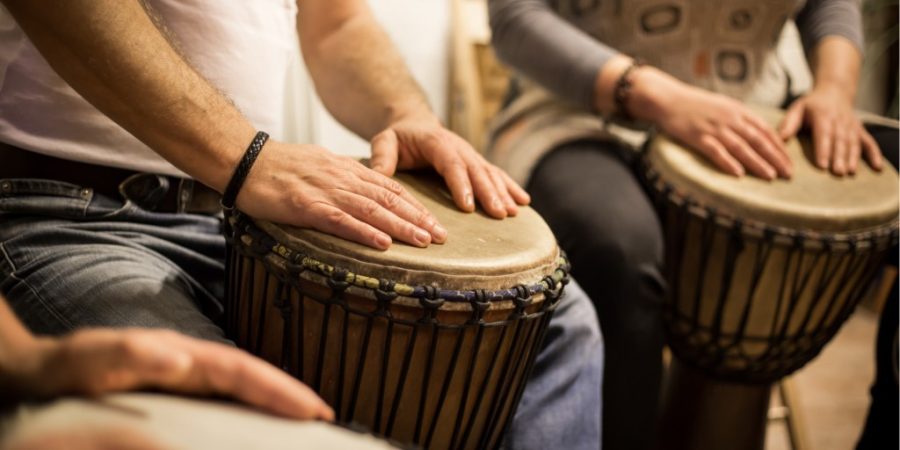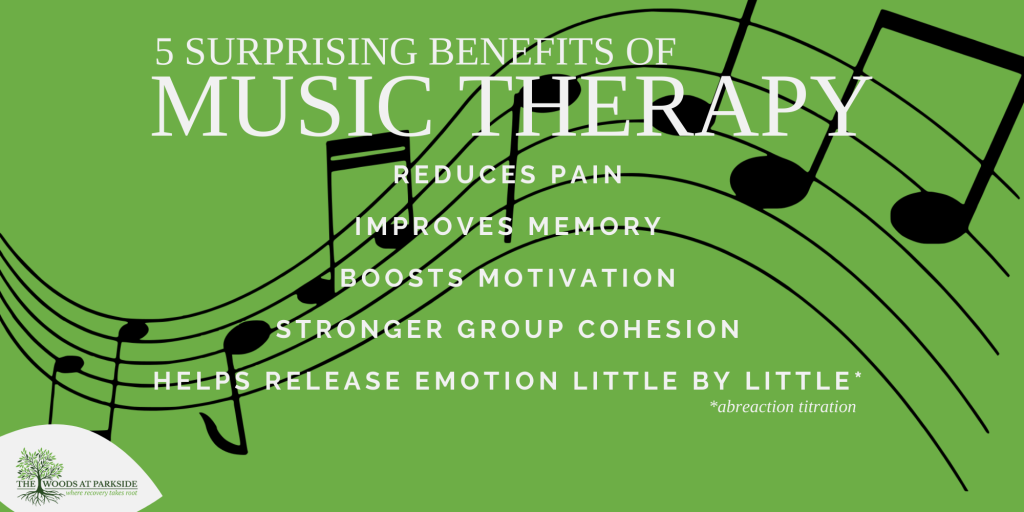
The idea of using music in healing has been around since the days of Plato and Aristotle. Then, during the late 1700s, scientists began discussing how music could be used in medical settings. However, it wasn’t until the 20th century that professionals began to use music therapy to help veterans recover from war trauma. Today, this therapy is used to help people recover from addictions as well. Here is an overview of what music therapy is, how it works, and five of the most surprising benefits of music therapy for addiction recovery.
Would you like to experience the healing power of music therapy for addiction recovery? Contact us for an appointment at The Woods at Parkside today!
Table of Contents
What Is Music Therapy?

Listening to music can help you feel better in many ways, and the benefits of music therapy for addiction recovery are well documented. However, music therapy is a much more structured and scientific approach. Credentialed music therapists use evidence-based treatments designed to help people recover from addictions as well as other conditions.
In a music therapy program, each individual has a treatment plan complete with personal goals. This type of therapy uses music, but it is a professional therapeutic method with many techniques to promote better overall health, emotional wellness, and commitment to recovery.
With this therapy approach, the professional uses both music and other modalities to help people with addictions come to terms with their lives and make their way forward. While there may be music at every session, it is typically used differently at various times with the intent of working on different aspects of addiction recovery.
What Happens in Music Therapy?
Two main things happen in music therapy. First, the participants hear or make music in some way. Second is the formal therapeutic process led by the music therapist. Some of the things you might do in music therapy include:
- Listening to music
- Singing
- Talking about lyrics and what they mean
- Move or dance to music
- Playing instruments
- Writing music or lyrics to a tune
- Having a group discussion about how the participants feel when listening, singing, or playing
Typical music therapy sessions might begin with a group conversation. First, your therapist leads you in a discussion of what you need and where your strengths lie. Second, you might talk about what kinds of music you like and your goals. The therapist then designs your customized treatment plan.
After the music therapy session is over, your therapist determines how effective the activities were in helping you with your goals. After that, they may suggest adjusting your plan.
Receptive Music Therapy
Receptive therapy is the first of two types of music therapy. It involves first listening and then responding to a musical experience. The response could be silently recognizing your feelings. Or it could be discussing the experience and related issues. It could also be responding in some other way, such as painting a picture inspired by the music or dancing to the music.
Active Music Therapy
Active music therapy is the umbrella term for three different experiences.
- Re-creation is a treatment technique in which your music therapist asks you to play or sing to an existing song. You do this in whatever way you feel will help you meet your individual goals. This active therapy helps you with many challenges, from physical rehabilitation to self-expression and social interactions.
- Improvisation means making music spontaneously using instruments, your voice, or your body, such as tapping your feet. The music therapist is active but also observing to understand and respond to your expressions.
- Writing music is also a helpful music therapy technique. You may compose an instrumental piece or write lyrics for a song. In some cases, you might perform the song you created and record it to listen to at home.
Do You Have to Be a Musician to Engage in Music Therapy?
No, you do not have to be a musician to participate and benefit from music therapy. The activities are created with the intent for anyone to join in, regardless of musical skills, age, or health.
Benefits of Music Therapy for Addiction Recovery

Some of the benefits of music therapy may seem obvious. For example, music has always been known for its ability to ease anxiety and agitation. People who are dealing with extreme stress often find peace while listening to their favorite songs. Here are five other benefits of music therapy that you may not have expected.
1. Improves memory
During an investigation into how music affects memory and attention, scientists discovered that people who listened to music before a task had a greater capacity to remember tasks than those who sat in silence beforehand. The researchers concluded that the music might have increased arousal in both sides of their brains to create this effect.
2. Reduces pain
Music therapy has been shown to reduce pain for people with many different types of diseases and injuries. Pain is often a part of both living with addiction and recovering from it. Pain can show up as bone or dental pain, muscle tightness, headaches, or many other types of hurt. Therefore, the pain reduction that comes with music therapy can help people get through this difficult time as they move towards a life of sobriety.
3. Brings stronger group cohesiveness
Group behavioral therapy can help people deal with the challenges of getting back to a life without drugs or alcohol. The problem is that sometimes people find it hard to engage in groups when they are struggling with the aftereffects of addiction. A study of CBT substance abuse treatment, when combined with music therapy, revealed that not only did more group members show up for the group session, but they participated more, regardless of age or the type of addiction they had.
4. Boosts motivation
People with dual diagnoses of both substance abuse and mental health disorders may find it hard to keep pushing towards sobriety. However, in one pilot study on music therapy, dually diagnosed people became more motivated to continue and engage in treatment when music therapy was a part of the program.
5. Helps with abreaction titration
Abreaction titration is a phrase that music therapists know well. The concept is that when treating trauma, repressed emotions must be released a little at a time. Unfortunately, people with addictions are usually dealing with many sources of past trauma, as well as the emotional pain of recovery. Music therapy can help them do this in a way that allows them to soothe themselves, reduce their anxiety, and feel more comfortable with the overall treatment program.
Where to Find Addiction Recovery Treatment with Music Therapy
Choosing an Ohio drug rehab or alcohol treatment center with music therapy can help see you on your way to a more satisfying life. At The Woods at Parkside, we offer a 45-day residential treatment program, as well as all our recovery options. These programs can include music therapy sessions to aid in healing from addictions. Our facility near Columbus, Ohio, has a beautiful natural setting. Even better, our physicians, therapists, nurses, and other staff provide the medical and psychological care you need for detox, addiction treatment, and reentering your daily life.
Could music therapy help you achieve sobriety? Contact us at The Woods at Parkside to set an appointment for addiction recovery treatment!
The post 5 Surprising Benefits of Music Therapy for Addiction Recovery appeared first on The Woods At Parkside.
Source
Original Author: Beacon User

